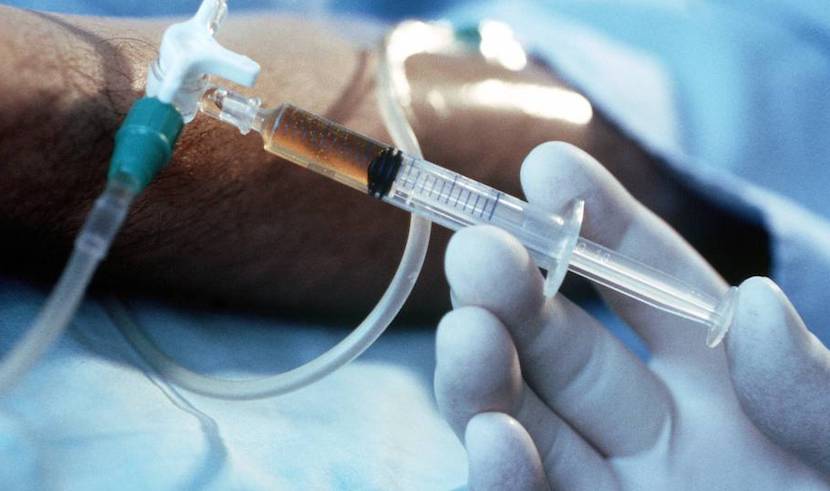Should Euthanasia Be Considered An Option in Egypt's Hospitals?
Is euthanasia considered an acceptable option in Egyptian society? If it isn't, should it be? Staff writer Dina Khadr speaks to experts in the field to find out.

Euthanasia is defined as the painless killing of a person who is suffering from an incurable disease. In Egypt, it is a practice that, much like other 'taboo' surgical procedures, is regarded negatively; with the majority of society's judgment on the matter stemming mainly from religion. While there are two types of euthanasia - active and passive - in the medical world, only the latter is practiced in Egypt regardless of its illegality. Passive euthanasia involves the doctor refraining from resuscitating the terminal patient while active involves causing their death to alleviate suffering. The practice of mercy killing remains - both in Egypt and worldwide - a source of debate, controversy and disagreement. There are those few Egyptian families and practitioners, however, who are willing to consider it and hold an open view, regardless of society condemning their decision.
Born and bred Egyptian housewife, daughter and mother, Layla*, is one of the few within her society that is not against the practice, having witnessed her father's suffering and considered euthanasia even though she'd been brought up to oppose the idea. Layla's* father, Ahmed Ali*, was already bed-ridden by the time his cancer was diagnosed. Reaching the end stages of his disease at an accelerated pace, the spirited father of three - who had a certain joie de vivre about him - wasn't granted the chance to bid his family farewell before the cancer had taken over most of his motor skills. The last few weeks leading up to the beginning of the end, saw Ahmed Ali* - the man with the boisterous laugh, the sharp wit and an unapologetic sense of humour - transform into the residue of a person. The final stages of his terminal cancer left him lifeless on a hospital bed; plugged to a series of machines with the occasional fly making its way to rest on his pale, unmoving hands.  “Honestly, I was praying for him to die in his last days. I couldn’t bear to see my father turn into someone so tiny, so helpless. He couldn’t even breath on his own,” says Ahmed's daughter, Layla*. “Of course, I felt a little guilty praying for his death. I might’ve considered euthanasia had it lasted for longer, but the doctors told us the end was near, and they were right.”
“Honestly, I was praying for him to die in his last days. I couldn’t bear to see my father turn into someone so tiny, so helpless. He couldn’t even breath on his own,” says Ahmed's daughter, Layla*. “Of course, I felt a little guilty praying for his death. I might’ve considered euthanasia had it lasted for longer, but the doctors told us the end was near, and they were right.”
Layla sat by her father’s bed for weeks as she watched his skin turn from a healthy complexion to a pale, almost blue hue. She’d sat by him as he writhed in pain and couldn’t breathe except by the aid of a machine. While for her, euthanasia wasn’t out of the question, a vast majority of Egyptian families would be opposed to her tolerant view as Egypt remains a culture that is starkly opposed to the idea; considering it an affront to religion.
They’re paying thousands of pounds every day for a person who isn’t alive anymore.
While Euthanasia is justifiable as being the merciful option by many, religious scholars and sheikhs are opposed to the practice, deeming it a form of suicide and disrespect towards the gift of life. Al-Azhar Scholar, Dr. Ashraf Saad, states that Islam is strictly opposed to it.
“Euthanasia is completely forbidden, be it in Islam or Christianity. Life is a gift from God and we are not God to decide who lives and who dies. God is the most merciful. When we decide to perform euthanasia on someone as an act of mercy, that is like saying we’re more merciful than God. Besides, anytime you suffer on this earth, God gives you countless good deeds for it,” says Dr. Saad.
Emphasizing that life is about hardships as much as it is about good moments, the Al- Azhar scholar preaches that people should take it as it is, with the bad and the good. From a religious standpoint, there is only one case where “death” can be administered.
“If the person is already clinically dead - which means his brain isn’t functioning anymore - then he can be removed from the ventilators,” says Dr.Azhari. “We get phone calls from families who’s relatives are clinically dead but have been in the hospital for a while. They’re paying thousands of pounds every day for a person who isn’t alive anymore. In these cases, we’re not opposed to them unplugging the machine.”
Passive euthanasia is performed by a lot of doctors in the country.
Surgical oncologist, Dr. Harvey Samuel - who had pursued his studies both in Egypt and abroad - has worked with terminal patients for years.
“When we have someone terminal in the ICU, we don’t actually make the decision for the patient or the family. We give the family the option of putting their relative on a ventilator or advise them not to, depending on the case. So when it’s a hopeless case and the ventilation is pointless, we’ll tell them that. Most Egyptian families, however, will still decide to put the patient on ventilation,” states Dr. Samuel.
The medical criteria for both, active and passive euthanasia, requires a diagnosis that is studied thoroughly and affirming that there will be no recovery and is in irreversible pain.
“By law, both are forbidden here. However, passive euthanasia is done by a lot of doctors in the country. When it’s passive, it basically means that if the terminal patient starts bleeding, we won’t give him a blood transfusion. Or if he goes into a coma and we know either way he won’t make it, we won’t put him on a ventilator. We’ll just let him die in peace,” explains Dr. Samuel.
If I know there is no hope for a cancer patient, then I will advise families to stop the treatment, and then it’s up to them to decide.
With the negative stigma surrounding the practice of Euthanasia in Egypt, medical schools don’t broach the topic much. But what of extreme cases such as the terminal stages of cancer, brain hemorrhages and Myasthenia Gravis - a type of autoimmune disease that eventually damages the respiratory system?
“The patient can’t even take his breath except with an artificial ventilator and it’s terminal. So to paint a picture; he’s basically lying there and can hear everything and see everything, but can neither breathe nor move, and will die eventually. So, is it more merciful to remove the ventilator or not?” asks Dr. Samuel.
Following research done by Egypt’s cancer index, there are 108,600 Egyptians every year diagnosed with cancer; with 72,300 dying from the relentless illness. According to the American Society, the patient goes through extreme problems with breathing, severe emotional trauma as well as a litany of other serious health defects. It is likened to feeling like an engine running on nothing but fumes.
A question begs to be asked; how does one make the decision? How does one stand by, watching their loved one writhe in pain with the knowledge that they might be able to take that suffering away? How does one also take the responsibility of making the choice to end the life of a loved one?
The only thing I’m conflicted about is; what is the criteria for someone being ‘terminal’?
“The medical criteria for Euthanasia - or the medical definition - is the merciful killing of hopeless cases that are in severe states of agony. As doctors, we don’t make these decisions, we give the patient’s family the option. For example, if I know there is no hope for a cancer patient then I will advise families to stop the treatment and then it’s up to them to decide,” explains the doctor. “But if they choose to put their relative on a ventilator, then by law we’re not allowed to remove it, regardless of how long they remain on it. As for me, I try to study the case from every possible angle with neutrality, and exhaust all possible options so that my conscience is completely clear.” HIV/AIDS Specialist, Dr. Sherif Soliman, states that due to the nature of his field and recent medical advancements, the situation is different for him than with terminal diseases such as cancer and Myasthenia.
HIV/AIDS Specialist, Dr. Sherif Soliman, states that due to the nature of his field and recent medical advancements, the situation is different for him than with terminal diseases such as cancer and Myasthenia.
“There is a very thin line, at least within my field of work, about whether or not it’s the end stage. In the 80's, I was working in Rwanda with cases infected with HIV, and we thought it was hopeless; a lot of our cases were indeed dying. But now, with all the new medications and with science improving so much, I don’t agree with it anymore, but my opinion applies only within my field. I cannot speak for other fields.”
For him, it was about not being the direct cause in her death, or at least not playing a hand in it.
Dr. Soliman’s concerns lie more with the terminology of the “terminal” case, in that it is a term that may vary from person to person.
“The only thing I’m conflicted about is, what is the criteria for someone being ‘terminal’? I’m speaking outside of religion, who’s to say if this is really the end stage or not? Because the definition of end stage can vary from one person to the other.”
Nour Salah faced a similar situation when her grand-mother was bedridden and fell into a coma. The family was faced with two choices, either to euthanise her or keep her on a ventilator.
“We were told it was a hopeless case and my father’s siblings voted on euthanasia. The doctors told them she's suffering so much and she's not going to make it either way. My dad however found out and forbade it,” says Nour. “He was very close to her. For him, it was about not being the direct cause in her death or at least not playing a hand in it; to just let her die natural and give her a chance. She died a few weeks later.”
Euthanasia is a practice that remains widely frowned upon;with only a handful of countries having only recently legalised it. In Egypt - while not legalised - passive euthanasia is administered as well as advised in certain cases by several of doctors.
*The names of some of the interviewees have been changed to protect their privacy.
- Previous Article Korba's Historical Cairo Palace Cinema to be Renovated
- Next Article The Jewellery Collection Paying Homage to Cairo's Golden Days
























